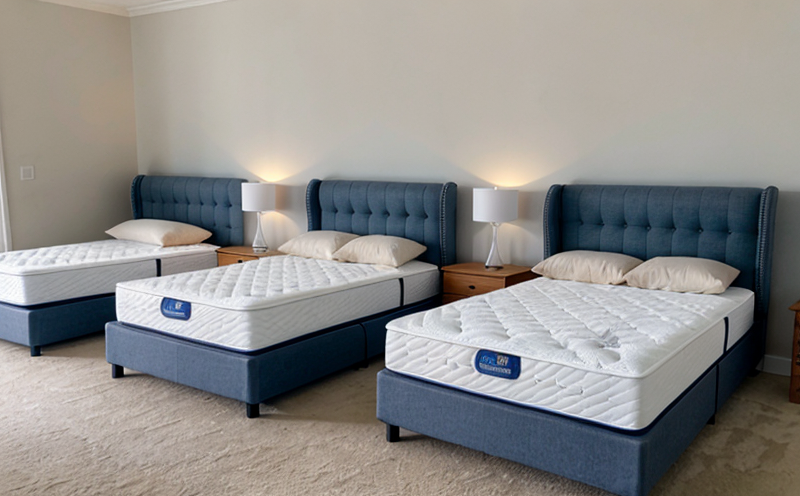NF EN 1725 Safety and Mechanical Resistance of Beds Testing
The NF EN 1725 standard is a crucial benchmark for ensuring the safety and mechanical resistance of beds. This European Norm specifies requirements, testing methods, and acceptance criteria to ensure that beds meet stringent standards in terms of stability, strength, and durability. Compliance with this regulation is mandatory for manufacturers, retailers, and importers operating within the EU market.
The standard applies not only to traditional bed frames but also to modern designs such as platform beds, box spring sets, and adjustable bases. The primary goal is to prevent accidents caused by instability or failure under normal use conditions. This includes tests that simulate real-world scenarios where forces are applied in various directions, ensuring the bed can withstand typical loads without compromising safety.
Testing involves several key aspects including stability checks, load-bearing capacity assessments, and structural integrity evaluations. Stability tests assess how well a bed resists tipping over when subjected to specific loads at defined points on the surface. Load-bearing capacity tests determine whether the product can support prescribed weights safely without collapsing or deforming excessively.
Structural integrity evaluations focus on identifying potential weaknesses in materials and construction methods that could lead to failure under stress. These tests are critical for ensuring long-term performance and durability, which is especially important given the lifespan of a typical bed frame often exceeding ten years.
In addition to these mechanical properties, NF EN 1725 also covers aspects related to human factors engineering and ergonomics. This includes considerations about comfort levels during sleep as well as ease-of-use features like accessibility for users with disabilities. By addressing both technical specifications and user experience expectations, this standard aims at creating safer, more comfortable sleeping environments.
Compliance with NF EN 1725 is essential for businesses operating in the furniture industry. Failure to meet these standards could result in product recalls, legal action, and damage to brand reputation. For quality managers, compliance officers, R&D engineers, and procurement teams alike, understanding this standard is vital for maintaining market competitiveness while adhering to regulatory requirements.
Given its importance across various sectors including retail, home furnishings, and healthcare facilities, ensuring adherence to NF EN 1725 should be a priority for any organization involved in the production or distribution of beds. Regular testing against these standards helps maintain consistent product quality and promotes consumer trust.
Why It Matters
The implementation of NF EN 1725 is essential not only for regulatory compliance but also for enhancing overall product safety. By adhering to these standards, manufacturers can significantly reduce the risk of accidents associated with unstable beds or those that fail under normal use conditions.
Besides preventing injuries, meeting this standard enhances brand reputation by demonstrating commitment to customer satisfaction and safety. It shows that companies are proactive about addressing potential hazards before they become actual incidents. This level of diligence can foster long-term relationships with customers who appreciate the extra care taken in designing safe products.
From a business perspective, maintaining compliance helps avoid costly penalties for non-compliance. Regulatory bodies often impose significant fines on firms found violating such standards. Additionally, failing to comply might lead to product recalls or even legal actions which can severely impact profitability and brand image.
In summary, NF EN 1725 serves multiple purposes - it protects consumers by reducing risks of injury from unsafe products; it strengthens brands through consistent quality assurance practices; and it safeguards businesses against financial losses due to regulatory violations. Thus, embracing this standard is beneficial for all stakeholders involved in the bed manufacturing process.
Industry Applications
| Application | Description |
|---|---|
| Traditional Bed Frames | The standard applies to conventional bed frames made from wood, metal or other materials. |
| Platform Beds | Ensures that these beds are stable and can support required loads without collapsing. |
| Box Spring Sets | Guarantees the durability of box springs under various stress conditions. |
| Adjustable Beds | Evaluates how well adjustable bases maintain stability and support during use. |
| Hospital Furniture | Ensures that hospital beds meet stringent safety requirements for patient care. |
| Home Furnishings Retailers | Aids in ensuring the products sold comply with relevant regulations, thus protecting consumers. |
Why Choose This Test
Selecting NF EN 1725 testing for beds offers numerous advantages that go beyond mere compliance. It provides manufacturers with a robust framework to evaluate their products' safety and durability, ultimately leading to improved quality assurance processes.
One significant benefit is the ability to identify design flaws early in the development stage. Through rigorous testing according to this standard, potential weaknesses can be pinpointed before large-scale production begins. This allows for necessary modifications that enhance both product performance and safety.
The process also fosters innovation by encouraging continuous improvement in materials selection and manufacturing techniques. Companies striving towards excellence may explore new technologies or improved processes based on feedback from these tests, thereby staying ahead of competitors.
Moreover, participating in NF EN 1725 testing demonstrates a company's dedication to maintaining high standards which can be attractive to potential clients seeking reliable partners. It establishes credibility and trustworthiness among peers within the industry as well as with consumers who value safety above all else when purchasing bed products.
Overall, choosing NF EN 1725 testing ensures that beds meet rigorous international benchmarks, providing peace of mind for everyone involved from manufacturer to end-user. This commitment not only meets regulatory requirements but also contributes positively to brand reputation and customer satisfaction.





